Here's something about me: I usually like drinking green tea plain.
Sometimes I'll take it with a squeeze of lemon and a dollop of honey – hot or iced depending on the season. Despite green tea's caffeine content, I never considered it a replacement for my morning coffee – but sometimes nowadays it serves that position, proudly.
With the proliferation of pills, powders, and general health claims around green tea, I wanted to get to the bottom of the cup story and figure out the proven health effects of green tea. Take a journey through my research the next time you grab a cup.
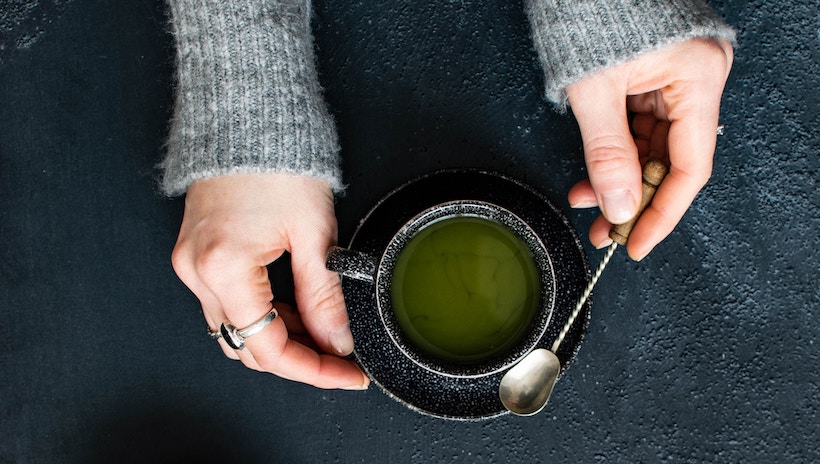
Green tea comes from the leaves of Camellia sinensis, a type of tree that's been used in tea production for thousands of years. This plant produces white, green, black, and oolong teas, depending on the oxidation levels when the leaves are processed.
During oxidation, the chlorophyll in the tea leaf gets broken down. This gradually turns the leaf from green to brown. For green tea, oxidation is halted early on, so the leaves remain "green." Hence, green tea.
Green tea is one of the least processed teas, and it's essential to use moderately hot water—not boiling—when brewing a cup. Using water that's too hot or over-steeping the tea can make your green tea taste bitter.
To make the perfect cup of green tea, wait for your boiled water to cool to around 170-175°F and steep your tea for no longer than three minutes.
If you prefer strong teas, don't be tempted to leave your teabag in the cup as you drink it. Instead, use an extra teabag or an extra scoop of loose leaf tea. Our friend, tea expert James of Wan Ling Tea House suggests also sampling fuller flavored light oolongs and white teas such as Bai Mu Dan.
Compared to green tea, black tea and oolong tea are exposed to a longer oxidation process, which results in a more complex flavor profile in the tea. Black tea is fully oxidized, and oolong tea is semi-oxidized.
Flavor-wise, black tea often has a woody or smoky taste resulting from its higher tannin content, while oolong tea might taste flowery in comparison. Other oolongs are baked, producing deeper and more complex teas.
Matcha is essentially green tea in a powdered form, though the production method differs from regular green tea.
For producing matcha, the tea leaves are harvested from trees that have spent their last 20-30 days of growth shaded from the sun. Along with affecting taste, this causes the leaves to produce more L-theanine, caffeine, and chlorophyll. Once the harvested leaves have been dried, their veins and stems are removed. After that, what remains is ground into a fine powder, which can then be dissolved in hot water to make matcha tea.
Drinking matcha tea allows us to ingest the tea leaves directly rather than ingesting an infusion of the leaves. Some people believe this intensifies green tea's benefits since matcha is a less-diluted version of green tea.
Research suggests that a cup of matcha tea can have over 100 times the antioxidant content of a cup of regular green tea.
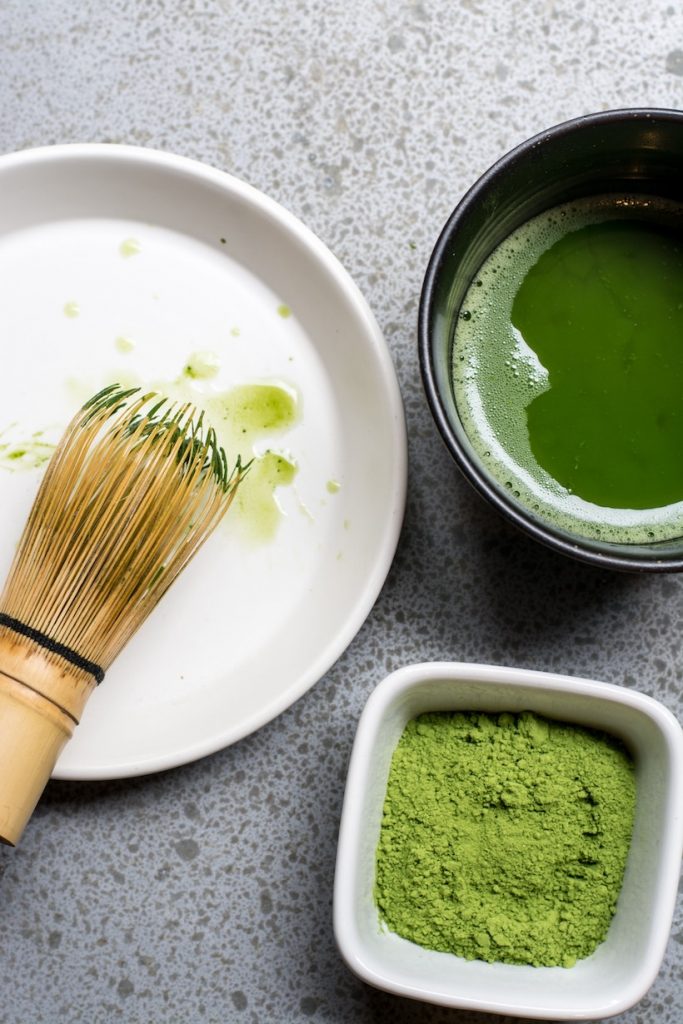
Green tea and coffee both contain caffeine, but that doesn't make them equal. One cup of coffee almost always has more caffeine than a cup of green tea. Also, caffeine from coffee tends to provide a quick jolt, followed by a crash. Green tea, on the other hand, provides a stabler, mellower energy boost, thanks to its calming L-theanine content (more on that in a bit).
Coffee also has different health benefits compared to green tea. Improved focus and lowered risk of stroke are just two benefits of regular coffee consumption. These benefits are due in part to the compounds found in the coffee bean, which differs from the compounds found in tea leaves.
As for green tea's benefits? There's a whole section on that coming later.
We've all heard that drinking green tea is good for our health. But have you ever wondered what exactly makes green tea so special?
The specific ingredients in green tea vary depending on its brand, its processing, and where the leaves were grown.
Generally, though, green tea's benefits can be attributed to the following active ingredients:
Caffeine is a chemical stimulant found naturally in many nuts, seeds, and plants.
Once ingested, caffeine affects the brain by blocking the effects of adenosine, which is one neurotransmitter responsible for making us feel tired. Caffeine also has a direct impact on your central nervous system – it will make you more alert and give short term cognitive benefits, but to excess, it can cause nervousness and anxiety.
Polyphenols are a compound found in many plant-based foods, including tea.
Polyphenols have natural antioxidant properties, and their positive effects on our health include:
Green tea leaves can have 20-35% polyphenols before brewing, depending on the tea's quality, growth location, and processing method. Typically, matcha is a more significant source of polyphenols than regular green tea.
L-theanine is an amino acid found in green and black teas. It can also be taken as a dietary supplement.
On its own, L-theanine increases serotonin and dopamine levels in the brain, which can help regulate stress and promote relaxation. Research also suggests that L-theanine combined with caffeine can improve focus and memory. L-theanine is responsible for the "smoother" feeling of energy in teas compared to coffee's lower concentration.

Catechins are flavonoids that give tea their astringent taste. Tea is the most common source of catechins in a Western diet.
Catechins have potent antioxidant and antimicrobial properties, and they are believed to help the body fight everything from infection to cancer.
Green tea tends to have very high catechin content because of its limited exposure to oxidation.
Vitamin K is a fat-soluble vitamin that helps the body's blood-clotting abilities and supports bone density. It's mostly found in leafy green vegetables.
Green tea leaves also contain vitamin K, but brewed tea doesn't contain more than a trace amount. However, one cup of matcha – which includes the actual tea leaf – can have up to 30 mcg of vitamin K.
Saponins are chemical compounds found in plants that produce foam when they're mixed with water. Green tea leaves are measured to have less than 0.1% saponin content, which means saponins can only be found in matcha tea.
When matcha powder is whisked into water, it produces a thin layer of foam, which is all thanks to the presence of saponins. Research studies have found that saponins can help lower cholesterol levels in the blood.
While matcha tea isn't a significant source of this chemical, saponins are still one of its many beneficial ingredients.
Green tea has a proud history as an herbal remedy in traditional Eastern medicine. Trimmer waistlines, stronger hearts, and overall longevity are some of the long-purported health effects of green tea.
Thanks to many years of modern scientific research, it's now possible to identify what makes green tea so beneficial and how exactly drinking it can support our health.
Though research on green tea is still ongoing, science has determined that it helps us in the following 12 ways:

Researchers have found that the risk of death from heart disease is significantly lower among people who drink 5-10 cups of green tea a day.
This longevity is believed to be due to epigallocatechin-3-gallate, or EGCG, the most abundant catechin in green tea. Chemically, EGCG can bind to plaque-causing proteins and dissolve them into smaller molecules. In humans, this means that once green tea is digested, EGCG can enter the bloodstream and protect the heart from plaque buildup, one of the symptoms of heart disease.

In a 1992 study, hairless mice were observed to have significant protection against skin cancer caused by exposure to UV-B radiation. While more research on the relationship between catechins and cancer is needed, research suggests that catechins from green tea may prevent environmentally-induced cell mutation, which is the first sign of cancer.

EGCG from green tea has also been observed to repress glucose production in animals. EGCG works by reducing glucose and A1C levels, which is similar to the function of insulin in the body.
Results from a 2006 study indicate that drinking six cups of green tea reduces the chances of developing type 2 diabetes. This might mean that green tea can help prevent and manage diabetes.

Green tea extract is a common active ingredient in weight loss supplements, and there's a good reason why. In a 2007 study conducted on the effect of EGCG on obesity, overweight participants taking an EGCG supplement burned more fat after meals compared to the placebo group. A similar result was observed in mice during a 2005 study.
These results suggest that green tea, with its high EGCG content, is an effective catalyst for weight loss. It's too early to tell whether green tea helps us stay slim for sure, so more research is needed.
Additionally, some studies suggest green tea suppresses appetite, especially among people who are overweight or those with Type 2 diabetes. In these cases, green tea could cause second-order effects such as weight-loss by reducing the number of calories people eat in a day.
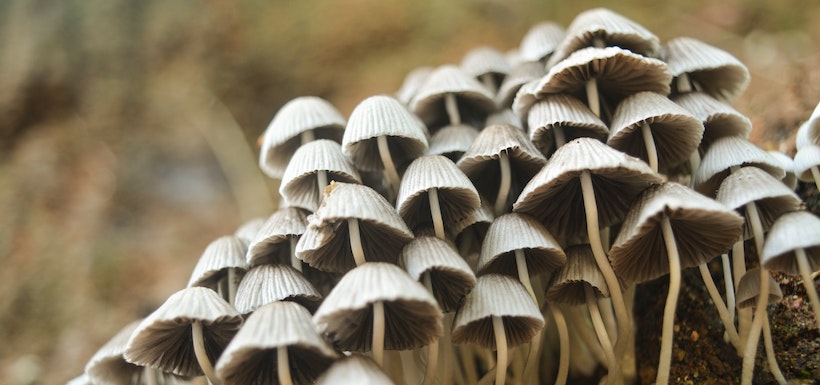
According to a 2004 study, EGCG can enhance the effects of antimycotics against Candida albicans, a pathogen that results in a fungal infection if left unchecked. Some side effects of oral antimycotic medication include nausea, diarrhea, sharp stomach pains, rash, or hair loss.
Because of EGCG's supportive antifungal role, it may be possible to treat Candida albicans with EGCG and a smaller dose of antimycotics to reduce the medication's side effects. EGCG has also been found to have antifungal properties on its own by stopping fungal growth in its early stages.

Rats that were given green tea supplement in a 2004 study were shown to have higher insulin sensitivity after 12 weeks. In the same study, catechins from green tea were linked to improved glucose metabolism.
Low insulin sensitivity, also known as insulin resistance, is positively correlated with metabolic syndrome and type 2 diabetes. While rats have different biology compared to humans, it's possible green tea can improve the human ability to metabolize glucose, improving insulin sensitivity.

Alcohol affects the liver by increasing lipid peroxidation, the chemical reaction that occurs within the liver as alcohol is introduced. A by-product of lipid peroxidation is acetaldehyde and free radicals, both of which can damage liver cells.
Antioxidants have been shown to inhibit lipid peroxidation. Furthermore, antioxidants from green tea have been shown to protect the liver from these chemical changes even after intoxication has occurred.
Mind you – this doesn't mean that drinking green tea is an antidote to a weekend alcohol binge. It just means it can help ameliorate some of the acute effects of alcohol.
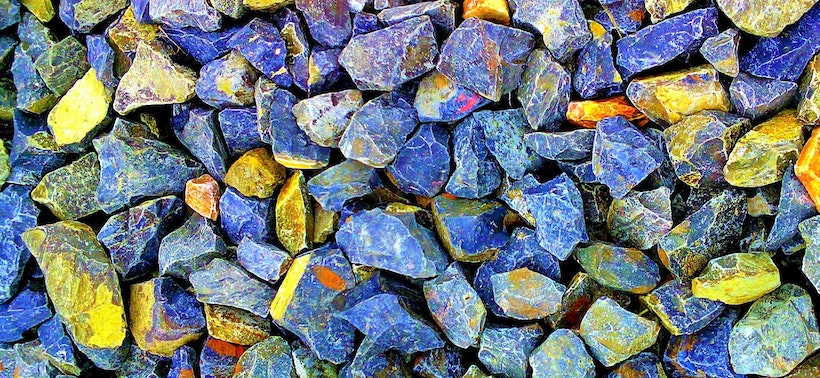
The human body maintains healthy bone density through bone resorption when the bone's osteoclast cells break down old tissue, and osteoblast cells produce new ones. Oxidative stress can cause bone tissue to be broken down faster than it's replenished, leading to brittle bones, fractures, and osteoporosis.
Studies show that green tea – with its high antioxidant content – can improve bone density by suppressing osteoclastic activity and supporting osteoblastic activity. Green tea helps work both sides – reducing break down and accelerating bone regrowth.

The caffeine and L-theanine in green tea have already been found to improve memory and focus significantly.
But that's not all! Drinking green tea has also been found to enhance neural health, which may help minimize cognitive decline during old age.

Free radicals are one of the environmental causes of premature aging. Dust, pollution, tobacco smoke, and sunlight are some familiar sources of free radicals that many of us encounter during the day.
The antioxidants in green tea can effectively neutralize free radicals, which can help protect our skin from damage and premature aging. You can drink green tea or apply it topically to reap its skin-loving benefits.

Green tea's ability to protect the brain against neural loss can prevent or delay the onset of Parkinson's disease.
Green tea is also thought to help avoid the formation of plaque in the brain, which is one of the symptoms and a theoretical cause of Alzheimer's disease.

Multiple studies show a relationship between tea consumption and depression. Specifically, higher consumption of green tea is correlated with lower depression risk. This may be due to the caffeine's mood-elevating properties working in conjunction with L-theanine's ability to combat anxiety.
It's not all good news when it comes to green tea, however. Superfood status or not, there are some adverse effects you need to keep an eye on while you're drinking green tea.
There is, of course, a fair amount of caffeine in green tea. Too much caffeine can increase anxiety levels and impair sleep quality, especially among the caffeine-sensitive, insomniacs, and people with anxiety disorders. Paradoxically, though, you can turn it to your advantage. Consider the coffee nap – a combination of brief sleep and caffeine – which shows huge benefits to energy in a 20-25 minute timeframe.
Caffeine is also highly addictive and considered the most used drug in the world. Caffeine addiction can lead to headaches and drowsiness when the supply is cut off, which is why moderation is key.

Tea leaves can absorb contaminants from the environment during their growth, and those contaminants can end up in our bodies when we drink the resulting tea. Green tea has been found to contain measurable amounts of aluminum, lead, and mercury.
The levels aren't generally believed to be toxic (don't test it by trying to overdose, though), and the benefits of green tea outweigh this small risk. Nevertheless, pregnant or breastfeeding women may want to take special care when drinking green tea.
For some people, especially those with sensitive stomachs, green tea on an empty stomach can cause indigestion or other adverse digestive effects. This is (of course) more of and individualized response, but something to keep in mind if you drink tea without food.
If you have issues with green tea but enjoy tea without eating, James from Wan Ling Tea House suggests:
"People with sensitive stomachs should avoid drinking green tea on an empty stomach. Either change to a dark tea e.g. Shu Puer or more heavily oxidised teas such as dark oolongs or black teas."
Mostly, scientists agree coffee and tea can't cause GERD. However, they may exacerbate symptoms if you are susceptible – so keep an eye (stomach?) out.
Unfortunately, there's probably something to this one – even if it was only tested in rats. Overconsumption of green tea (or green tea extracts) can lead to liver damage.
The study isn't suggesting you drop the mug – it's perfectly safe to have a cup or two of green tea a day. However, the rising popularity of green tea as a health food has led to the increased use of green tea extract. Green tea extract delivers an extremely concentrated dose of green tea, which might cause inflammation in the liver as it's processed.
Prolonged exposure to green tea extracts – or an absolutely voluminous consumption of green tea – might overwhelm the liver and cause hepatotoxicity or toxic liver disease.
In a 2001 study, scientists were able to induce goiters in rats by adding green tea extract to their diet.
Green tea contains fluoride, which can block the thyroid from absorbing iodine. Lack of iodine is the most common cause of goiters when the thyroid becomes enlarged to absorb more iodine.
Studies show that the catechins in green tea inhibit the body's ability to absorb iron during mealtimes. Eventually, prolonged iron deficiency results in anemia.
Green tea doesn't cause anemia directly, but it plays a role by exacerbating the consequences of an iron-poor diet or blocking some of the iron you do consume in a meal.
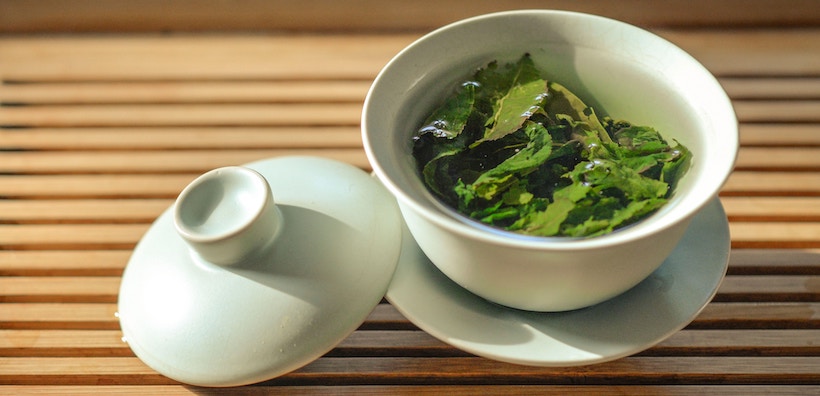
Now, we get to the bottom line – with the proven benefits and some of the adverse effects, is green tea good for you?
Yes – green tea appears to be good for you in moderation. Like most things you might consume, there is probably a limit where you cross over into the ill-advised, but short of taking too many extracts, green tea appears generally safe.
The evidence shows that green tea provides a net benefit to our health, as long as it's consumed in reasonable amounts.
For most healthy people, 3-5 cups a day maximum would allow you to take advantage of green tea's full herbal potential.
Green tea is the perfect drink to kickstart your day in the morning. It can also give you an extra boost just before your workout.
Sometimes you don't want energy, though, and just want to sleep!
While caffeine has an energizing effect, too much of it will disturb your sleep. Everyone reacts to caffeine differently, and the amount of caffeine you consume will eventually affect your tolerance levels as well.
If you're caffeine sensitive, you should stop drinking green tea (and – really – any caffeine) six or eight hours before bedtime.
For the most part, green tea's benefits outweigh its risks. Because green tea is most harmful in concentrated doses, you should minimize your consumption of matcha tea and products containing green tea extract.
Due to the effect of catechins on iron absorption, green tea should also be avoided during mealtimes, especially if you're anemic.

So now you have more of the story when it comes to green tea. Long a staple of traditional medical care as well as a purported general health helper, modern research has backed up many of the claims.
The next time you drink a cup of green tea, you'll remember the benefits. It's a fantastic drink, and we'd probably all do a little better to consume it in moderation. Let's raise our glasses to green tea!
Nice in-depth post brother I love your work.